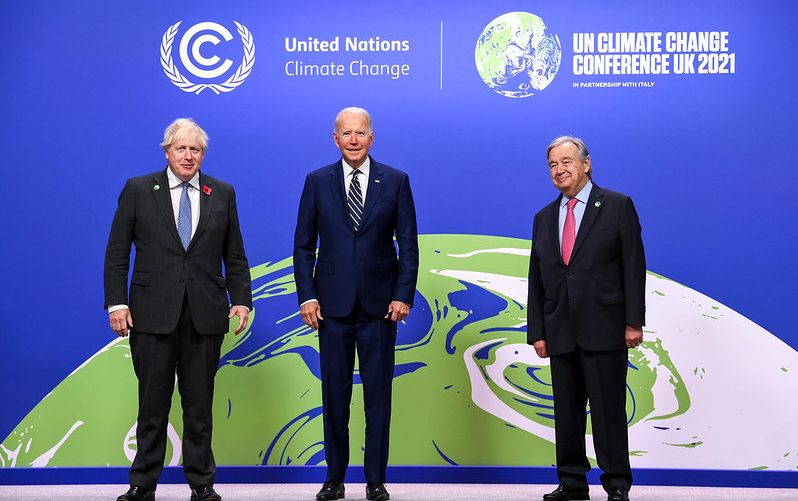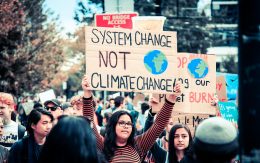We need climate action. Urgently.
While this should, by now, be clear to ordinary people and politicians alike, so far, little action has been taken by governments. Apart from recurring summits, which only bring forward protocols, agreements and promises that rarely have any strict enforcement or sanctioning mechanism if not followed through, radical measures and reforms remain absent.
From October 31 until November 14, 2021, world leaders convened in Glasgow for the COP26 summit, also known as the Conference of the Parties to the UN Framework Convention on Climate Change, to which 197 states agreed in 1992. The 26th major UN Climate Summit aimed at finding measures to reduce emissions and prevent the impending climate crisis in the coming decades by keeping global warming below the target of two degrees Celsius.
However, this year’s COP26 already had a rough start: After being postponed last year due to the global Covid-19 outbreak, China, one of the biggest emitters, and Russia declared already before the beginning of the 26th summit that they would not attend, for which they received severe criticism, amongst others by President Biden.
Disappointingly, albeit unsurprisingly, COP26 did not bring forward any groundbreaking achievements apart from a few more or less ambitious intentions or “plans” on protecting the environment in the coming years. While we, for one, can applaud governments’ commitment to end deforestation and drastically reduce methane emissions, a critically potent greenhouse gas and a leading cause for climate change, by 2030, there is little information on how and if this can be achieved.
As for the reduction of methane levels, President Biden stated this would be attained by “reducing methane leaks” through “capturing methane to turn it into new revenue streams”. Implementing these measures would ensure lasting cuts of methane emissions resulting from drilling operations and the equipment used in the US. Once they are in place, it would reduce said emissions by 75% compared to 2005. In total, 104 nations have promised to cut methane emissions. Yet, important to note, this is merely a global pledge, not a structured agreement.
In terms of the goal “to halt and reverse forest loss and land degradation by 2030“, it is astonishing that more than 130 nations who possess over 90% of global forests signed on to this pledge. However, it will be interesting to see how populist leaders like Jair Bolsonaro will stick to their promises. Bolsonaro has been known for his destructive environmental policies, and deforestation rates have spiked since he took office in 2019.
While it is not entirely clear how and if these goals will be met, and there seems to be no stringent enforcement or sanctioning mechanism if not obeyed, these commitments nevertheless serve as a glimmer of hope for much-needed progress. Also, they shine a more positive light on the largely unproductive summit and its disappointing outcomes.
Top or Flop?
So, what is the verdict of COP26 – top or flop? As argued in an AlJazeera opinion piece, COP26 may be considered a big flop. Indeed, its “final document, called the Glasgow Climate Pact, showed no progress regarding existing national plans to cut emissions by 2030, which are not enough to limit global warming to 1.5C (2.7F). As things stand, the planet is headed to a disastrous 2.4C (4.3F) of heating.” Moreover, fossil fuels will continue to dominate energy consumption.
Also, this passage from an article in The Washington Post is telling:
“The agreement will not put the world on track to avoid catastrophic warming beyond 1.5 degrees Celsius (2.7 degrees Fahrenheit). But officials said it represents a significant step on a path to a safer future.”
The outcome of COP26 and its Pact is, mildly said, unsatisfying and shows the lack of urgency that most governments portray regarding the climate crisis.
In general, the “commitments” made during the COP26 are also rather vague: They state what they want to achieve within a year, however, without a clear explanation of how.
In the resulting agreement, four significant “achievements” are listed, namely:
- Mitigation: secured near-global net-zero NDCs from 153 countries and future strengthening of mitigation measures
- Adaptation & loss and damage: boosted efforts to deal with climate impacts
- Finance: mobilised billions and trillions
- Collaboration: worked together to deliver
As indicated before, one should remain pessimistic about the likelihood of the targets being met. The wording in the Glasgow Climate Pact remains somewhat vague, with little indication of how commitments will be enforced and the goals achieved: “As part of the Glasgow Climate Pact, all agreed to revisit and strengthen their current emissions targets to 2030 in 2022”. The BBC sheds light on this problem: “most commitments made at COP will have to be self-policed. Only a few countries are making their pledges legally binding.”
In addition, other watered-down commitments were added to the Pact, such as the commitment to “phase down” rather than “phase out” coal, a fossil fuel responsible for 40% of yearly global emissions.
Also, India’s commitment to achieving net-zero emissions by 2070 proved to be divisive. Some argued that this is an ambitious target for a developing country with a population of over 1.4 billion, others were disappointed given that it is “several decades behind the 2050 commitments made by the west, and 10 years behind China’s 2060 target.” Others, perhaps rightly so, suggest that it is hypocritical to expect India “to commit to the same net zero pledge as the developed countries that, historically, have created most of the emissions causing the climate crisis.”
Yet, at the eleventh hour, it might be more important that all parties stick to the same targets. However, developed states, responsible for most emissions in the past decades, should help developing countries to adapt and achieve these goals. Moreover, India is also the fourth-largest greenhouse gas emitter and, as stated in The Guardian, “it depends on coal for two-thirds of its energy generation, and is projected to increase its emissions in the next couple of decades as millions move out of poverty and increase their electricity use.” A transition to sustainable energy sources before 2070 is therefore paramount.
COP 26 – This could have been a zoom call
In conclusion, while it may be significant that world leaders convene to talk about the climate and make promises to stick to specific targets, merely talking about it will not suffice. The planet needs urgent climate action to keep global temperature rise below two degrees Celsius above pre-industrial levels. Flying in thousands of people, partly on private jets, to a conference where, sidenote, mostly animal-based and hence not typically sustainable food was served, not only sends a wrong message. It perhaps also makes people wonder whether the climate crisis is indeed that grave if certain representatives continue to portray the same behaviour patterns to the broader public, even though these are officially deemed damaging for the climate? Why should the public change its behaviour when also global leaders do not seem to care about living a more climate-friendly life? And how should citizens perceive the climate crisis as a matter of urgency when not even this climate conference can convey the gravity of the problem?
An earnest and credible approach to this “climate conference” would have been to prevent those extra emissions by organising an online conference. Seriously, this could have been a zoom call.
Sources BBC (2021): COP26: Biden attacks China and Russia leaders for missing summit, https://www.bbc.com/news/world-59138578, accessed 16. November 2021 BBC (2021): COP26: What was agreed at the Glasgow climate conference?, https://www.bbc.co.uk/news/science-environment-56901261, 18. November 2021 COP26 (2021): COP26 THE GLASGOW CLIMATE PACT, https://ukcop26.org/wp-content/uploads/2021/11/COP26-The-Glasgow-Climate-Pact.pdf, 23. November 2021 Daly, M. (2021): Biden’s climate plan aims to reduce methane emissions, AP News, https://apnews.com/article/climate-joe-biden-business-scotland-europe-aa0893a5aaa68f4ec3a431dc2712a587, 19. November 2021 Ellis-Petersen, H. (2021): Is India’s pledge of net zero by 2070 an ambitious target – or worthless words?, The Guardian, https://www.theguardian.com/world/2021/nov/05/is-indias-pledge-of-net-zero-by-2070-an-ambitious-target-or-worthless-words, accessed 27. November 2021 , M., Ferns, G. (2021): Brazil signs agreement to halt deforestation – but Bolsonaro cannot be trusted, The Conversation, https://theconversation.com/brazil-signs-agreement-to-halt-deforestation-but-bolsonaro-cannot-be-trusted-171091, 6. November 2021 Gupta, J. (2021): Reaching net zero by 2070 is possible – but it’s what India does right now that matters, The Guardian, https://www.theguardian.com/commentisfree/2021/nov/05/net-zero-2070-india-renewables-climate-finance, accessed 28. November 2021 Jordans, F. (2021): What is COP? Key facts and terms at climate summit explained, AP News, https://apnews.com/article/climate-science-europe-paris-scotland-eb324b733e1b76d19d6d7324d95b3e32, 21. November 2021 Maizland, L. (2021): COP26: Here’s What Countries Pledged, Council on Foreign Relations, https://www.cfr.org/in-brief/cop26-heres-what-countries-have-pledged, accessed 15. November 2021 Pandey, K. (2021): CoP26: 104 countries promise to cut methane emissions; What is the global pledge about, DownToEarth, https://www.downtoearth.org.in/news/climate-change/cop26-104-countries-promise-to-cut-methane-emissions-what-is-the-global-pledge-about–80059, accessed 28. November 2021 Polychroniou, C. J., (2021): COP26 was a flop but there is still hope, AlJazeera, https://www.aljazeera.com/opinions/2021/11/23/cop26-was-a-flop-but-there-is-still-hope, 16. November 2021 Tankersley, J. et al. (2021): With Methane and Forest Deals, Climate Summit Offers Hope After Gloomy Start, The New York Times, https://www.nytimes.com/2021/11/02/world/europe/climate-summit-methane-forests.html?name=styln-cop26®ion=TOP_BANNER&block=storyline_menu_recirc&action=click&pgtype=Article&variant=show&is_new=false, accessed 16. November 2021 The Washington Post (2021): The Glasgow climate pact, annotated, https://www.washingtonpost.com/climate-environment/interactive/2021/glasgow-climate-pact-full-text-cop26/, accessed 25. November 2021 Wilson, S. (2021): The COP26 menu is ‘like serving cigarettes at a lung cancer conference’, The Big Issue, https://www.bigissue.com/news/environment/cop26-haggis-the-most-unsustainable-dish-at-glasgow-climate-conference/, 17. November 2021








Be First to Comment